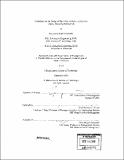Guidelines for the design of flexibility in queueing systems : model, measures, and analysis
Author(s)
Gurumurthi, Suryanarayanan, 1975-
DownloadFull printable version (4.633Mb)
Other Contributors
Sloan School of Management.
Advisor
Stephen C. Graves.
Terms of use
Metadata
Show full item recordAbstract
(cont.) have a relatively limited impact on throughput and overall utilization measures when compared to strategic flexibility design parameters such as the assignment of long-term job responsibilities to servers. However, we show that this influence on performance is significant enough that various flexibility design alternatives are better compared after taking into account the control policy that will be used to operate the system. Furthermore, and motivated by the recent interest in revenue management techniques for operational systems, we show that such operational control policies can have disproportionate influence on revenue and cost measures of performance; this fact further underscores the importance of having such models, measures, and analytical tools to examine various system design alternatives for improving performance. An analytical and computational framework is presented that has been developed for the performance analysis of arbitrary queueing networks with multiple heterogeneous servers and multiple customer classes, where customers have the flexibility of being processed by more than one server and servers possess the capability of processing more than one customer class. Jobs of a given class may arrive according to an independent Poisson process to a facility consisting of multiple heterogeneous servers. The service time for the processing of any given job class at any given server is assumed to be exponentially distributed with a mean that could vary by job class as well by server. Significantly, we do not impose any restriction on the set of job classes that can be processed by any given server. Assuming finite work-in-process capacity in terms of the number of jobs already in the system, we allow for multiple stages of processing in the queueing system. In order to motivate the research, we first identify the different forms of flexibility in such queueing systems that are relevant to managers given their importance as design factors and control policies for higher performance. Next, we present an analytical framework whose goal is to capture for performance analysis, the relative impact of the different forms of flexibility so identified. Third, we demonstrate the usefulness of the modeling framework through a simple but illuminative numerical analysis of single-stage queuing systems that in turn shows the significance of these flexibility mechanisms to the performance measures of interest to system managers. In terms of insights from the modeling efforts, we first show that when evaluated within this framework, control policies such as job-routing and job-selection rules
Description
Thesis (S.M.)--Massachusetts Institute of Technology, Sloan School of Management, 2004. "September 2004." Includes bibliographical references (leaves 63-64).
Date issued
2004Department
Sloan School of ManagementPublisher
Massachusetts Institute of Technology
Keywords
Sloan School of Management.